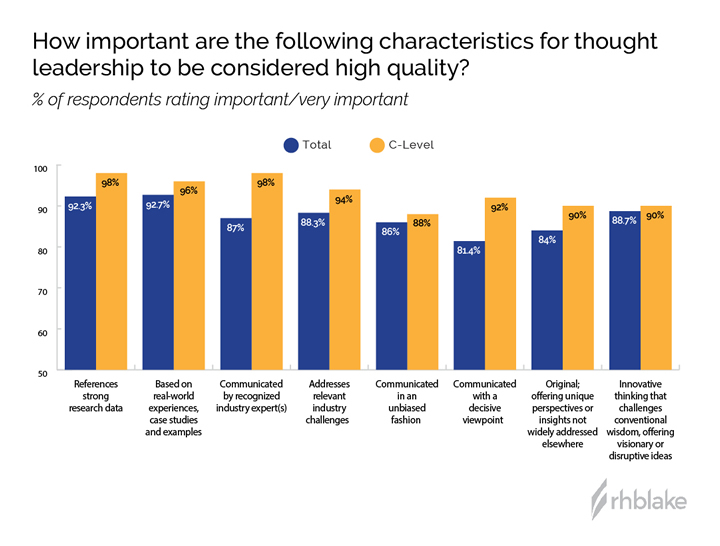Shorten Your Sales Cycle with Real-World Thought Leadership
Business-to-business manufacturers with long sales cycles face a major marketing challenge—perceived risk. Buyers of costly, complex offerings are risk-averse. They can’t afford to make mistakes when buying products and services that are complex and costly, and that have a far-reaching impact on their organizations
Anything you do as a manufacturer to reduce perceived risk with your buyers can help shorten your sales cycle. One way to do this is by building credibility and trust. And a proven way to build credibility and trust is by publishing thought leadership that’s based on real-world experiences, case studies and examples.
At RH Blake, we define thought leadership as content that delivers expertise, guidance, or a unique perspective on a professional topic or field (such as technology, business processes, and industry trends). This content may be presented in many formats: articles, blogs, podcasts, presentations, research reports, videos, webinars, whitepapers. It excludes advertising or product and promotional literature.
For thought leadership to build maximal credibility and trust, it must be based on actual experience, be founded on strong research data, and address relevant industry challenges. Here’s what we mean.

Trustworthy thought leadership is based on actual experiences
Effective thought leadership stems from genuine insight and real-world experience. Some marketers attempt to pass off promotional content as thought leadership, but B2B decision-makers can tell the difference—and they expect more. They seek research-driven content that directly addresses business challenges, presented with professionalism and objectivity. At the C-suite level, expectations are even higher across all measures.
In our 2025 Thought Leadership in Manufacturing Report, our survey reveals that 93% of B2B manufacturing decision-makers say the best thought leadership is based on real-world experiences, case studies and examples.
The most effective thought leadership highlights successful implementations that showcase innovative business approaches (“leading thoughts”) and the tangible benefits customers have gained from adopting the solution. Savvy sales professionals leverage this type of content to drive meaningful engagements and close deals.
Credible thought leadership is based on strong research data
When your insights are original, they capture your audience’s attention. And when they’re backed by your own research and data, they establish credibility and command respect. In our 2025 Thought Leadership in Manufacturing Report, our research reveals that 98% of B2B manufacturing decision-makers say the best thought leadership is references strong research data.
Effective thought leadership grounded in real-world data begins with research, observation and information gathering. Interviewing industry stakeholders—including customers, suppliers, and employees—reveals firsthand perspectives on pain points, successes, and emerging challenges. Focus groups and online workshops further refine these insights by gathering qualitative feedback in a controlled setting, allowing manufacturers to test ideas, validate assumptions, and shape their thought leadership to align with industry needs.
Surveys offer a scalable way to collect both qualitative and quantitative data, generating actionable insights on market trends and customer expectations. Analyzing existing industry datasets from government reports and trade publications can also uncover opportunities. By combining these research methods, manufacturers can produce credible, data-driven thought leadership that resonates with their audience.
Trustworthy & credible thought leadership addresses relevant industry challenges
Ninety-four percent of B2B manufacturing decision-makers say effective thought leadership addresses relevant industry challenges, according to our research.
Manufacturers operate in complex environments shaped by evolving regulations, supply chain disruptions, technological advancements, and competitive pressures. Thought leadership that directly addresses these challenges provides valuable insights, helping businesses navigate uncertainty and optimize operations.
By focusing on relevant issues—such as efficiency improvements, sustainability initiatives, or digital transformation—manufacturers position themselves as trusted and credible advisors rather than just vendors. Decision-makers seek content that goes beyond generic messaging, offering research-backed perspectives, case studies, and expert analysis tailored to their needs.
When thought leadership aligns with pressing industry concerns, it attracts engagement, builds credibility, and fosters meaningful conversations. It also strengthens customer relationships by demonstrating a deep understanding of customer challenges—and offering actionable solutions. Ultimately, B2B manufacturing thought leadership succeeds when it informs, educates and equips businesses to make better decisions.
Reduce risk, reduce your sales cycle
Thought leadership is a powerful tool for B2B manufacturers looking to shorten their sales cycle by reducing perceived risk. Buyers of complex, high-value solutions need confidence in their decisions, and the most effective way to build that confidence is through trustworthy, research-driven insights.
As our 2025 Thought Leadership in Manufacturing Report confirms, the most impactful thought leadership is based on real-world experiences, strong research data, and relevant industry challenges. By sharing case studies, leveraging proprietary research, and addressing pressing industry concerns, manufacturers position themselves as trusted advisors rather than mere suppliers. This approach not only enhances credibility but also fosters deeper engagement with potential buyers, accelerating the decision-making process.
Thought leadership that is informative, insightful, and actionable does more than educate—it builds lasting relationships and drives meaningful business results. Manufacturers that embrace this strategy will stand out in competitive markets, earning trust and shortening their path to sales success.
Red the report: The 2025 Thought Leadership in Manufacturing Report: Thought Leadership’s Impact on Long Sales Cycle Offerings in the Manufacturing Ecosystem.
Dan Konstantinovsky is Strategy Director at RH Blake, the leading B2B manufacturing-focused marketing agency. www.rhblake.com
Comments (0)
This post does not have any comments. Be the first to leave a comment below.
Featured Product

